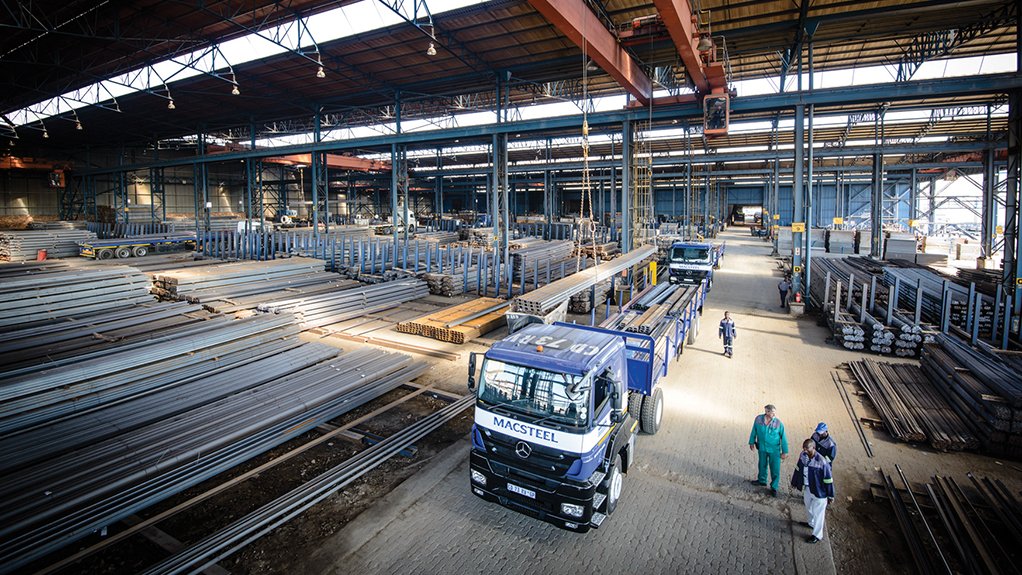The legislation put in place amid the Covid-19 pandemic is compounding the “exceptionally challenging” business environment already faced by companies when operating in Africa, where each country presents its own challenges, says Macsteel Exports senior branch manager Adrian Isemonger.
He oversees the Macsteel Exports business unit, which acts as the Macsteel group of companies’ conduit into Africa.
“The challenge we have is in trying to understand the regulations in each country, with the understanding and implementation of the legislation being separate issues, aggravated by the restrictions on the movement of people across borders.”
Macsteel notes a disconnect between legislation and what has been implemented, which has caused “immense confusion” when exporting into Africa.
“For example, at the beginning of Level 4, there was a misunderstanding involving the mining sector and some of our customers in Zimbabwe and Zambia were under the impression that we could not service them.”
Macsteel has opened its doors following the initial hard national lockdown and is operating and sending product to certain African countries. However, if South Africa reverts to Level 5, this will pose a huge operational challenge for the company, which has experienced reduced demand where industries are not fully operational, at a standstill or sites are on hold, specifically in the construction and mining industries.
“Border closures also translate to a loss of income for businesses and traders operating between countries, as do restrictions on movement between cities,” says Isemonger.
Therefore, should the virus become more prevalent in African countries and the borders close completely, the implications for trade and the working relationship with customers are uncertain, says Isemonger.
Logistical Challenges
Africa generally presents challenges relating to logistics and border crossings, with each country’s border having specific documentation requirements, says Isemonger.
“Some of the frequent challenges we experience range from custom systems going down in some of the countries, leaving trucks standing for days until they come back online, and the state of roads in some countries being unfit to drive on, to the liability of transporting companies and their drivers,” he adds.
As the initial stages of the lockdown only permitted essential services to operate, Macsteel consistently had discussions with government to determine whether the company would be able to do business with specific sectors and across borders.
“Understanding the severity of the lockdown regulations in South Africa and that certain African countries weren’t following the same legislative measures, Macsteel developed a full pack of certified documents ensuring fully functional above-board business operations locally and across borders.”
This includes compliance with the guidelines developed by the Southern African Development Community, which outline harmonisation and facilitation of cross-border transport operations across the region during the pandemic.
“All participating countries are complying with the guidelines of this document. To date, we haven’t experienced any new challenges with cross-border transport and ensure that our drivers are carrying the relevant permits and the full pack of certified documentation required by the Department of Trade, Industry and Competition.”
Defaulting Debtors
“When doing business in Africa, one of the thoughts that keeps one up at night is whether you will get paid.”
An existing challenge faced when working in Africa is the risk involved in extending credit.
“Within a persistently constrained economy, the battle of managing cash flow is a continuous challenge. This is further exacerbated by ‘bad debtors’, with late payments and insolvency being two of the most cited causes of long-term damage to business growth,” explains Isemonger.
There are multiple risks associated with extending credit to African markets, especially collecting defaulting debtor payments. There are also times when Macsteel finds it difficult to source information on its customers’ solvency.
The company highlights that the lack of transparency of in-country legal systems and proceedings in foreign courts often provides further challenges when faced with default.
“As a result, insurers are cutting back significantly on trade credit as the risk of doing business in Africa has become more precarious.”
In addition, people in the rest of Africa are not partial to doing business with South Africans, says Isemonger, noting that clients can not only be seen once or twice a year - to build and sustain strong business relationships requires consistent representation from companies.
“Companies in Africa want to deal with the people they trust and who they have built a relationship with,” adds Isemonger.
To improve the ease of doing business across Africa, countries need to address the overall risk and put workable solutions in place to mitigate the impediments around logistics and reorganise their borders to reduce delays.
Macsteel Exports operates on behalf of the Macsteel group of companies but also works with its network of five fully-fledged Macsteel businesses in Angola, Zambia, Ghana, Malawi and Mozambique.
“We consolidate orders, providing a channel for all businesses within the Macsteel group to service Africa. We supply the entire sub-Saharan geographic region with the broadest range of carbon steel, stainless steel, specialty steels, aluminum products and value-added processes to all industry sectors,” concludes Isemonger.
Edited by: Zandile Mavuso
Creamer Media Senior Deputy Editor: Features
EMAIL THIS ARTICLE SAVE THIS ARTICLE
ARTICLE ENQUIRY
To subscribe email subscriptions@creamermedia.co.za or click here
To advertise email advertising@creamermedia.co.za or click here













